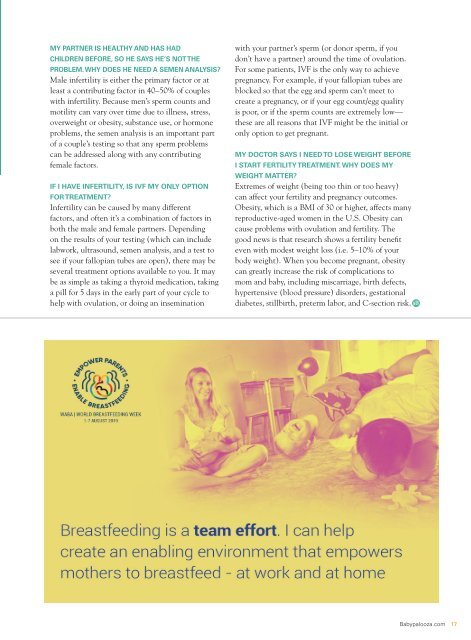Babypalooza Summer 2019
Create successful ePaper yourself
Turn your PDF publications into a flip-book with our unique Google optimized e-Paper software.
MY PARTNER IS HEALTHY AND HAS HAD<br />
CHILDREN BEFORE, SO HE SAYS HE’S NOT THE<br />
PROBLEM. WHY DOES HE NEED A SEMEN ANALYSIS?<br />
Male infertility is either the primary factor or at<br />
least a contributing factor in 40–50% of couples<br />
with infertility. Because men’s sperm counts and<br />
motility can vary over time due to illness, stress,<br />
overweight or obesity, substance use, or hormone<br />
problems, the semen analysis is an important part<br />
of a couple’s testing so that any sperm problems<br />
can be addressed along with any contributing<br />
female factors.<br />
IF I HAVE INFERTILITY, IS IVF MY ONLY OPTION<br />
FOR TREATMENT?<br />
Infertility can be caused by many different<br />
factors, and often it’s a combination of factors in<br />
both the male and female partners. Depending<br />
on the results of your testing (which can include<br />
labwork, ultrasound, semen analysis, and a test to<br />
see if your fallopian tubes are open), there may be<br />
several treatment options available to you. It may<br />
be as simple as taking a thyroid medication, taking<br />
a pill for 5 days in the early part of your cycle to<br />
help with ovulation, or doing an insemination<br />
with your partner’s sperm (or donor sperm, if you<br />
don’t have a partner) around the time of ovulation.<br />
For some patients, IVF is the only way to achieve<br />
pregnancy. For example, if your fallopian tubes are<br />
blocked so that the egg and sperm can’t meet to<br />
create a pregnancy, or if your egg count/egg quality<br />
is poor, or if the sperm counts are extremely low—<br />
these are all reasons that IVF might be the initial or<br />
only option to get pregnant.<br />
MY DOCTOR SAYS I NEED TO LOSE WEIGHT BEFORE<br />
I START FERTILITY TREATMENT. WHY DOES MY<br />
WEIGHT MATTER?<br />
Extremes of weight (being too thin or too heavy)<br />
can affect your fertility and pregnancy outcomes.<br />
Obesity, which is a BMI of 30 or higher, affects many<br />
reproductive-aged women in the U.S. Obesity can<br />
cause problems with ovulation and fertility. The<br />
good news is that research shows a fertility benefit<br />
even with modest weight loss (i.e. 5–10% of your<br />
body weight). When you become pregnant, obesity<br />
can greatly increase the risk of complications to<br />
mom and baby, including miscarriage, birth defects,<br />
hypertensive (blood pressure) disorders, gestational<br />
diabetes, stillbirth, preterm labor, and C-section risk.<br />
<strong>Babypalooza</strong>.com 17









